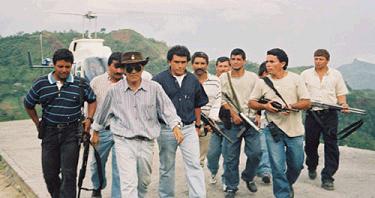Emerald Cowboy


There is no doubt that Eishy Hayata is a fascinating man. However, Emerald Cowboy is not the movie to introduce the world to him. It is one big vanity project that strokes Hayata's ego. There's an easy way to tell also. The main character is Eishy Hayata, played, oddly enough, by Hayata. Hayata also wrote the screenplay, which is coincidentally based on his autobiography. Talk about vainglorious. Emerald Cowboy was directed by Andrew Molina, so Hayata didn't do everything. Hayata is a Japanese-American who went to Colombia with nothing and over the years built an empire on the emerald trade. Think of him as a one-man DeBeers, dealing in emeralds instead of diamonds and across the Atlantic Ocean.
Mining emeralds in Columbia is dangerous, and the traders call themselves "esmeralderos," or emerald cowboys. And parts of rural Columbia feel still feel like the Old West. Miners and traders carry guns to defend themselves against rivals, guerillas, kidnappers, and other assorted baddies. One problem is that while Hayata must be a good businessman, the film portrays him as always being in the right place at the right time. He meets a beautiful woman that teaches him how to examine rough emeralds. A chance encounter in a small bar leads to a partnership, and later, because he of his nationality, a Japanese national wants to bring him a large amount of business. Missing from the film is any sense of his determination, work ethic, or empire building.
A large portion of the film is an extended flashback to his younger days, where Hayata, played by Luis Velasco, learns the ropes. Okay, it cannot be that hard to find a Japanese actor to play a younger Hayata, especially given the surprisingly large Japanese population in South America. Watching Velasco is surreal, especially since his English is horrible (Hayata's is perfect). In fact, aside from Hayata and Carolina Aristizabal (who plays Hayata's wife), nearly everybody's English is unintelligible. This part of Emerald Cowboy traces his gradual ascent, partnering with American Dave (Ricardo Wilke) and meeting Aurelia. The acting is the primary turn-off in these segments. It doesn't seem like anybody is a professional actor, and working in a language that is not their primary one doesn't help matters. Why does this movie even exist? A documentary would be just as good, if not more effective. Hayata paints himself as the perfect person, rising to the occasion despite all the things set out against him. It is this one-sided view of things that is distasteful.
Hayata isn't a good actor either, and when the film jumps back to the near-present, Emerald Cowboy begins a quick descent into the hilarious. Now, as President of a successful company, local Columbians, mostly union workers, feel resentful. They try everything they can disrupt his business, whether it be death threats, extortion, or fanning the flames of nationalism against this foreigner. Hayata has his allies, especially among the rural miners. He extols the value of hard work and free trade, trying to stand up against the stupid unions. As things come to a head, his lines become more egotistical, and have the effect of producing more laughs than anything else. The low point of Emerald Cowboy comes right before the end, where he delivers a mini-sermon on who he is and what drives him. It seems excessively mean to criticize Hayata given his current condition (revealed at the end of the film), but Emerald Cowboy presents things so simplistically that it has the effect of turning a highly successful entrepreneur into a caricature.